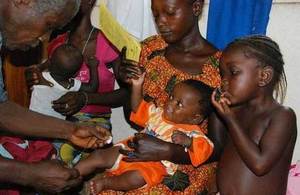New UK support for global immunisations to save a child’s life every 2 minutes
The commitment to Gavi will protect millions of people from some of the world's most deadly diseases.

5-month-old Mohamed gets his second dose of pneumococcal conjugate vaccine. Picture: Doune Porter/GAVI Alliance.
Britain will continue to support global immunisation in poor countries against life threatening diseases including Meningitis, Diarrhoeal disease and Pneumonia, through new support for Gavi, known as the Vaccine Alliance.
The UK’s commitment to Gavi will save around 1.4 million children’s lives through the provision of cost-effective immunisation programmes, meaning that one child’s life is saved every 2 minutes.
During the 2016 to 2020 period, the UK’s investment in Gavi will:
- Provide an additional 76 million children with access to immunisation programmes against killer diseases
- Help support a huge scale up of the Human Papilloma Virus vaccine, which acts to prevent cervical cancer in women and girls.
Overall, the UK’s support to Gavi will help them deliver 1.5 billion immunisations and save 5 million lives between 2016 and 2020. They also expect to increase the proportion of children who are fully protected with the 11 vaccines recommended by the World Health Organization 10-fold to 50%.
Justine Greening said:
Some of the world’s most deadly and debilitating diseases are entirely preventable through immunisation. Britain’s investment in immunisation through Gavi has already saved millions of lives and contributed to the fall in global child deaths.
Investing in immunisation is one of the most cost-effective ways of saving lives and improving living standards, health and the global economy. It is in all our interests that we keep up the momentum to ensure that all the world’s children are protected with the safest and most modern vaccines.
Chief Secretary to the Treasury Danny Alexander said:
The UK is a world-leader in providing support for developing nations across the world, from tackling ebola to supporting girls into school, as this commitment to save 1.4m lives through the Vaccine Alliance demonstrates.
I’ve prioritised spending on international aid because it’s crucial in not only saving millions of lives, but in maintaining the UK’s high standing across the globe, and promoting global prosperity that is in all our interests.
In the 5 years 2016 to 2020, the UK will invest up to £1 billion in Gavi, so long as others contribute to ensure Gavi meets its target of $7.5 billion.
Gavi is likely to play an important role in the financing and roll out of a future Ebola vaccine.
Notes to editors
- The new UK support for Gavi is worth up to £1 billion over the 5-year period of 2016 to 2020.
- Created in 2000, Gavi is a global vaccine alliance bringing together public and private sector organisations with the shared goal of achieving equal access to new and underused vaccines for children living in the world’s poorest countries. Since then Gavi has immunised an additional 440 million children and averted 6 million deaths.
- The UK is providing £1.32bn to Gavi from 2011-2015. Support for Gavi delivers a number of DFID’s objectives, including the Millennium Development Goal of reducing child deaths, aid transparency, value for money, economic development, and unlocking the potential of women and girls.
- The UK has committed to give up to £1 billion to Gavi over the 2016 to 2020 period, so long as others help it meet its replenishment target of $7.5 billion. UK commitments through innovative financing are likely to generate an additional £440 million for Gavi during 2016-2020.
General media queries (24 hours)
Email mediateam@dfid.gov.uk
Telephone 020 7023 0600
If you have an urgent media query, please email the DFID Media Team on mediateam@dfid.gov.uk in the first instance and we will respond as soon as possible.